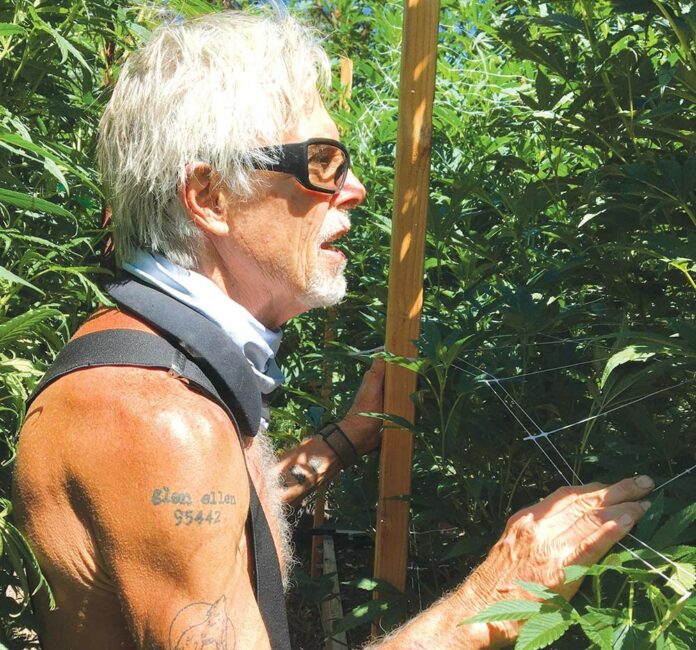Mike Benziger has grown many things in his life, but not this.
“We’re not growing placebos,” Benziger tells me at Glentucky Family Farm, where his pot patch looks and feels more like a jungle than a garden. It’s challenging to move around plants that press in from two sides and tower overhead.
Before he began growing weed, he grew grapes, made great wine and helped create the Benziger brand. As of August 2020, Mike has the crucial documents from both the State of California and from Sonoma County to cultivate weed legitimately. Hurray!
I sang Mike’s praises at a Sonoma Valley Planning Commission Zoom meeting, which gave him a thumbs-up, and later before the Sonoma County Board of Supervisors, also via Zoom. A half-dozen others, including Mike’s neighbors, testified, along with cannabis lawyer, Omar Figueroa.
Also on Zoom, Kumail Raza, who works for Sonoma County in the permits department, described Mike’s operation: 50 plants on a 2,400-square-foot parcel, with no plants visible to the public and with no odors that could possibly offend visitors at nearby Jack London State Historic Park. The authorities scrutinized nearly everything about Mike’s Farm. The whole process felt to me like an invasion of privacy.
To grow cannabis legally these days you have to allow the authorities to inspect setbacks from roads and waterways, monitor wind direction, measure use of water and keep an eye on security systems meant to prevent, or to at least mitigate, break-ins and theft.
Supervisor Susan Gorin said that she had visited Glentucky Family Farm and talked to “the applicant” whom she described as “a well-known person in Sonoma Valley.”
Supervisor Shirlee Zane tried to sound like an advocate for employees’ rights and insisted that cannabis workers are habitually paid poorly. She urged Benziger to provide healthcare benefits for his workers and sick leave, too. Thanks, Shirlee!
Mike described his own garden as “pharmaceutical” and said his emphasis is on cannabis as medicine. He also testified that he grows 20 different kinds of fruits and vegetables and that he’s committed to agricultural diversity. Later the same day, I understood why he told me that if he had to do it all over again, he might not get into the cannabiz. It’s costly, time-consuming and emotionally draining. Sonoma County has made it nearly impossible for citizens to become legit pot farmers.
Mike tells me, “If small-time growers like me are to survive, we’ll need dispensaries that will carry our weed.”
Fortunately, the town of Sonoma now has a real dispensary. No, not right this minute. But in August the Sonoma City Council awarded SPARC, one of the coolest cannabis companies, a conditional certificate to operate a dispensary on Sonoma Highway about a 15-minute drive from the city’s center.
SPARC was a surprise winner. When the Justice Grown folks, one of the finalists for the certificate, announced that they would name their proposed dispensary “The Jewel Mathieson Wellness Center,” I thought that they were a shoo-in. Honoring the work and the memory of Mathieson, a longtime cannabis activist who passed away on Aug. 5, 2020, seemed like an idea whose time had come.
But it was not to be. Justice Grown is linked to a law firm in far-off Chicago. SPARC is local, owns and operates a cannabis farm in Sonoma Valley, runs dispensaries in Santa Rosa, Sebastopol and San Francisco, and has a proven track record. The representatives from Justice Grown who testified before the council members tended to be overbearing. That was my impression. I watched and listened via ZOOM.
SPARC came across as humbler and smarter. “We haven’t been lobbying,” SPARC’s Erich Pearson told me, shortly before the city council voted to award him and his group a permit. “We don’t have to do backroom shenanigans.”
Justice Grown promised to donate $1,000,000 to the city of Sonoma over the course of its first five years of operation provided it was granted a license. Was that a bribe? Some citizens thought so. SPARC’s offer to donate $4,000 per month in free cannabis to low-income medical patients, and those needing palliative aid, came across as genuinely philanthropic.
For more than a decade, residents of the town of Sonoma have traveled weekly, if not daily, to Cotati and Santa Rosa to buy cannabis and then gone home. That made no sense to many local citizens, and to cannabis activists such as Jewel Mathieson and her husband, Ken Brown, a former mayor and council member who planted the first idea for a dispensary ages ago.
Segments of the wine industry have been opposed to a cannabis dispensary in Sonoma, which would bring competition for tourist dollars. If SPARC’s dispensary is to succeed it will have to rely a great deal on sales to out-of-towners. That does mean a fight for disposable income.
Benziger thinks that in the long run cannabis has a good chance of becoming more popular than wine because of a generational shift.
Michael Coats of Michael Coats Public Relations and a leading cannabis activist, tells me, “Sometimes the city of Sonoma can feel like the most conservative place of earth.” Now with a dispensary, that perception will surely shift.
Before I left Benziger’s cannabis jungle, he gave me samples of two of his strains: La Bamba and Banana. At home, I smoked them both and emailed: “I’m glad you’re not growing placebos. Your weed worked wonders.”
Jonah Raskin is the author of “Dark Past, Dark Future: A Tioga Vignetta Murder Mystery.”









